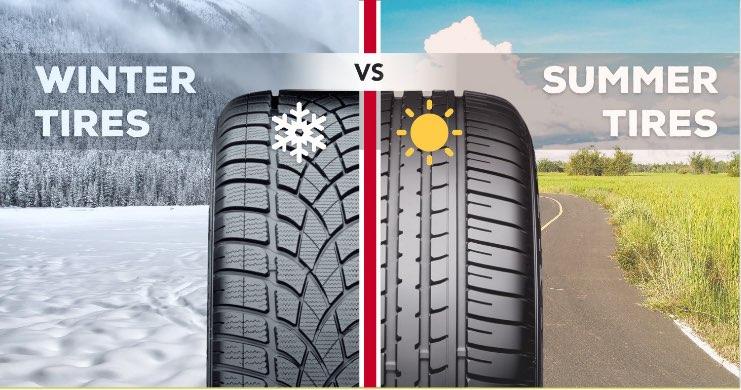Keeping your winter tires on all year round may be tempting, but is that an acceptable solution? Comfort on the road, current legislation or safety, or savings, here is what you need to know about driving with winter tires in summer and all year round.
Why Use Winter Tires
The winter tire, or snow tire, has broad and deep grooves designed for winter conditions. Thanks to its unique pattern and rubber adapted to low temperatures, it offers excellent road holding in cold weather and allows you to roll.
When Can You Drive With Your Winter Tires?
It is recommended to use winter tires (also called snow tires) when the temperature drops below 7°C.
In winter conditions, below 7°C, the braking distance of a winter tire is shorter than that of a standard tire on any ground (dry, wet, snowy, ice, pavement), and the winter tire provides better adhesion.
Do Tires Wear Faster on Winter Tires Than on Summer Tires
Contrary to popular belief, and for most brands, winter tires used in winter conditions do not wear out any faster than summer tires.
Does the Law Allow Driving With Winter Tires in Summer
The law does not prohibit driving in summer with winter tires. If you wish, you can continue to drive/ride with your snow tires in summer and winter.
Reasons Not to Keep Your Winter Tires in Summer
Safety
Above 7°C, winter tires perform less well than summer tires, especially for braking distances.
For temperatures above 7°C, the rubber on the tread of a winter tire softens and loses efficiency.
On the other hand, below 7°C, winter-certified tires (M+S and 3PMSF* markings) perform better than all-season tires in winter conditions.
To Save Fuel
The rolling resistance of a winter tire is more excellent than that of a summer tire of the same size. Driving with winter tires in summer means more fuel consumed and CO2 emissions.
Comfort
Changing your snow or winter tires for models suitable for summer and higher temperatures is a choice that is beneficial for your driving comfort. All-season tires guarantee better road holding above 30°C, allowing you to drive comfortably and safely.
Winter Tires Are Not Designed to Withstand High Temperatures
A tire is made with so-called "thermogram" rubbers. These retain all their elasticity when the temperature drops below 7°C. On the other hand, their rubber is not designed for high temperatures.
Tests have shown that braking distances are much more significant than summer tires. If you wish to drive with your winter tires in summer, you should reduce your speed to guarantee your safety and that of other road users.
Winter Tires Are Noisier
Despite advances in technology, snow tires are still noisy. They can't compete with all-season tires that get you used to the comfort of their silence.
Is Keeping Snow Tires an Economical Choice?
Finally, the financial aspect can justify keeping your winter tires in the summer. If the tires are already worn, their life will be minimal. Hot asphalt will accelerate rubber wear. The blades will disappear quickly. These tires will not last and will force you to control your driving constantly. It is up to you to examine whether the savings achieved in this short period are worthwhile.
On the other hand, if your snow tires are still new, the choice to take advantage of the summer to wear them out is more questionable. Indeed, as the summer accelerates their wear, you will have to get winter tires again next season. However, depending on your type of driving, a snow tire used only in winter can last several years.
Tips for Maintaining Winter Tires in Summer
Above 7°C, your snow tires must be replaced by tires made for pavement. Before storing your snow tires during the summer, take the opportunity to check the wear. Cracked tires lose effectiveness, even if the wear limit is not reached. Also, remember to check the geometry of the tires regularly.
Cracked tires lose effectiveness, even if the legal wear limit has not been reached. It is also essential to regularly check the geometry of your tires.
So, drive with tires adapted to the season for your comfort and safety. You increase the life of your winter tires by storing them away from the heat for the following winter.


No comments yet